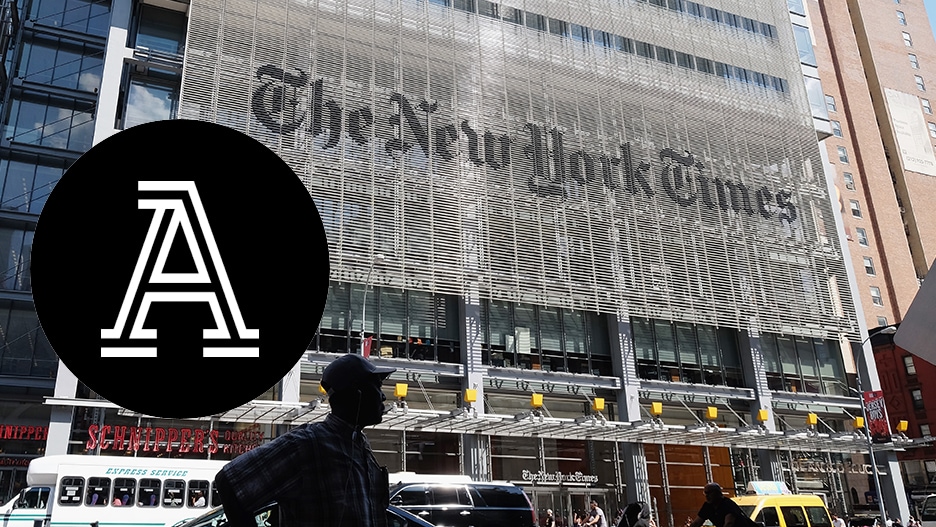The newspaper giant’s stock price dropped nearly 11% on Friday after the acquisition of the sports-news site was announced
Still, many experts are calling the purchase a smart move, allowing the company to expand into local markets and speed up its goal of hitting 10 million subscribers at a moment when investors are placing a premium on subscriber-based business models for content producers. (The Athletic’s 1.2 million subscribers will join the paper’s existing stable of 8.3 million subscribers.)
“The NY Times’ decision to acquire The Athletic is a solid financial maneuver,” Mike Woosley, COO of data company Lotame, told TheWrap, noting that the purchase price may be a bargain given the company’s current $7.13 billion market cap. “They’ll spend 6% of their market cap for a 12% overnight increase in paid subscriptions. With its reach, portfolio and brand recognition, the New York Times will inevitably make those subscribers much more valuable.”
The Athletic, a six-year-old sports site that provides national and local coverage on more than 200 clubs and teams, has been a huge success story. In 2021, according to web analytics firm SimilarWeb, visits to the subscription sports news site grew by 70%, as did total unique visitors, when compared to the previous year. Moreover, the site’s bounce rate — or the number of people who left after being on one page — fell in 2020 and again in 2021.
“They grew significantly faster than the rest of the group,” Seema Shah, senior director of research and analytics at Similarweb, told TheWrap. While The Athletic saw growth of over 70%, the next-best site was Sports Illustrated, which saw 37% growth. Meanwhile, another sports site, Bleacher Report, declined 12% in unique visitors compared to 2020. Further, The Athletic had the greatest amount of year-over-year visitor growth in 2021 when compared with peers like Sports Illustrated and Barstool Sports.
Shah attributes the low bounce rate and significant traffic growth of The Athletic to its specialized coverage of unique teams, which appeals to diehard fans more than the wider sports coverage of big-name outlets — like the New York Times. The Athletic acquisition, then, could be a move to diversify sports coverage and appeal to a wider audience overall by bringing in a bunch of smaller, more dedicated audiences.
The $550 million pricetag is also notably less than the $750 million-plus deal that The Athletic had been seeking last year after talks with both the Times and Axios broke down.
For what it’s worth, The Times’ own sports coverage saw a traffic increase of 30% in 2021 and a unique visitor increase of 20%, Shah said, but also reported an increased bounce rate. “So that was sort of a negative sign,” she said. “They also looked like they were gaining some traffic share and this will probably accelerate that, which is obviously what they want to do,” she said, adding that the Times would benefit from The Athletic’s international sports coverage.
In addition to its news operations, the Times also has developed other products, including New York Times Cooking, games, Wirecutter and the news-audio app Audm. With this acquisition, the paper not only expands its news offerings to subscribers, but is able to penetrate into more local markets in sports-loving regions where the Times has less news coverage. And as Levien noted, while The Athletic will remain a standalone brand, it will eventually become a part of the Times’ bundle of offerings — giving readers more value to their subscriptions.
Media companies are increasingly strategizing around consolidated subscription models, much like video streaming services have done, Anthony Gonsalves, senior vice president of publisher development at video platform Connatix, explained. “Similar to the way Hulu, ESPN+ and Disney+ are bundling their subscriptions, this deal brings together diverse audiences across verticals to cross-promote and grow loyalty,” Gonsalves said. “As the industry continues to shift toward subscription-based strategies, we can expect to see more bundled offerings and acquisitions like this, but the publishers who foster trusted relationships with readers through enriching, quality content across verticals will see the most success.”
While discounted and bundled subscription options will continue to trend, there may be good reason the Times will wait to add The Athletic to that mix. “Don’t expect The Athletic to be included in your unescalated NY Times subscription right away,” Woosley said. “Conveying a distinct subscription decision and value proposition is the smartest way for The Times to discipline itself in unlocking the value of these subscribers and this transaction.”



